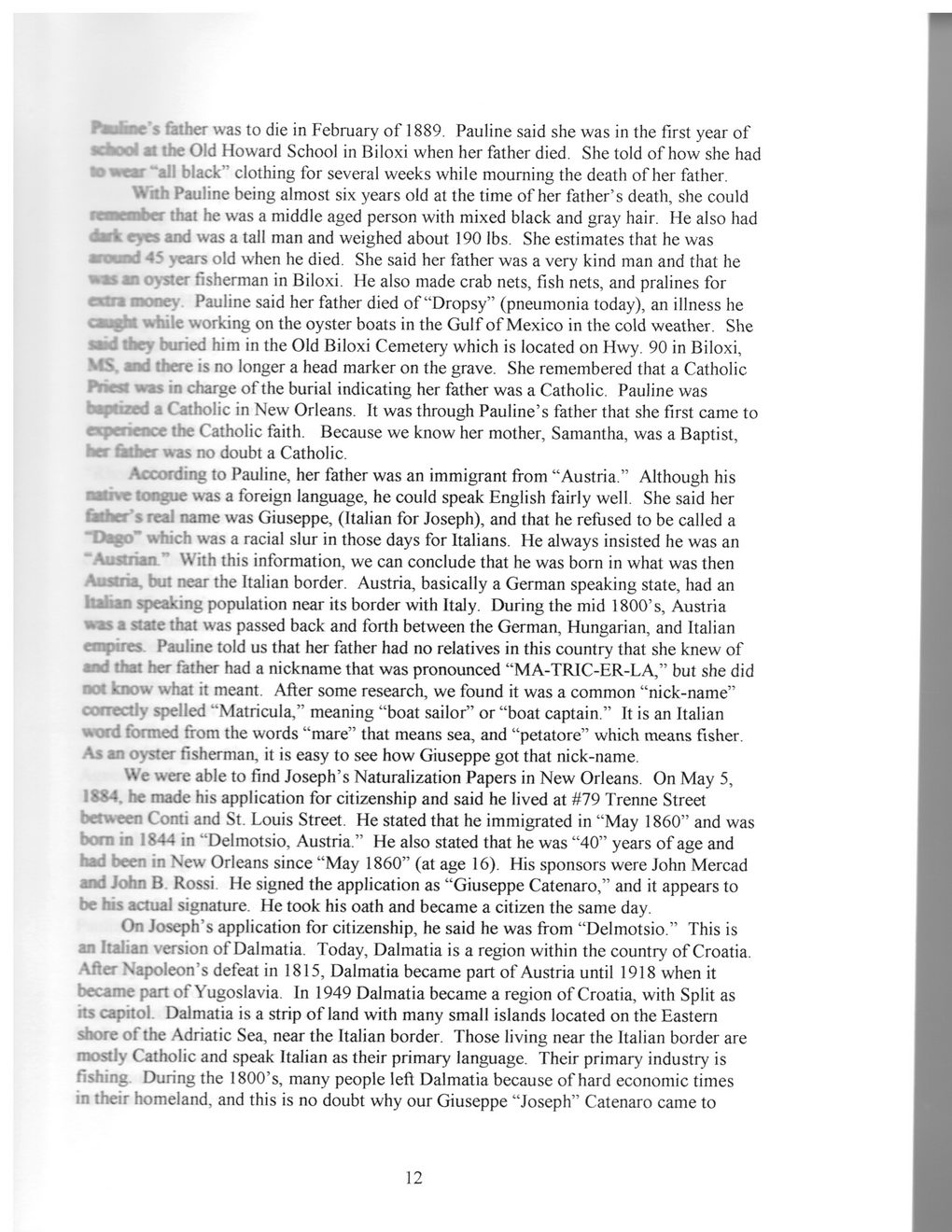This text was obtained via automated optical character recognition.
It has not been edited and may therefore contain several errors.
Aafcae's father was to die in February of 1889. Pauline said she was in the first year of rtod at the Old Howard School in Biloxi when her father died. She told of how she had lo ?ur "all black? clothing for several weeks while mourning the death of her father. With Pauline being almost six years old at the time of her father?s death, she could naeariwr that he was a middle aged person with mixed black and gray hair. He also had dafc eyes and was a tall man and weighed about 190 lbs. She estimates that he was aroMNf 45 years old when he died. She said her father was a very kind man and that he oyster fisherman in Biloxi. He also made crab nets, fish nets, and pralines for etfn aaooey Pauline said her father died of ?Dropsy? (pneumonia today), an illness he caq^t while working on the oyster boats in the Gulf of Mexico in the cold weather. She aid they buried him in the Old Biloxi Cemetery which is located on Hwy. 90 in Biloxi, MS. ad there is no longer a head marker on the grave. She remembered that a Catholic Not ws in charge of the burial indicating her father was a Catholic. Pauline was hftiird a Catholic in New Orleans. It was through Pauline?s father that she first came to operieace the Catholic faith. Because we know her mother, Samantha, was a Baptist, her lather was no doubt a Catholic. According to Pauline, her father was an immigrant from ?Austria.? Although his aariw tongue was a foreign language, he could speak English fairly well. She said her father's reaJ name was Giuseppe, (Italian for Joseph), and that he refused to be called a ?Dago- which was a racial slur in those days for Italians. He always insisted he was an ~ Ataman-? With this information, we can conclude that he was born in what was then Aoatra, but near the Italian border. Austria, basically a German speaking state, had an Into speaking population near its border with Italy. During the mid 1800?s, Austria ms a state that was passed back and forth between the German, Hungarian, and Italian ea^Hres Pauline told us that her father had no relatives in this country that she knew of and that her father had a nickname that was pronounced ?MA-TRIC-ER-LA,? but she did not know what it meant. After some research, we found it was a common ?nick-name? correctly spelled ?Matricula,? meaning ?boat sailor? or ?boat captain.? It is an Italian word formed from the words ?mare? that means sea, and ?petatore? which means fisher. As an oyster fisherman, it is easy to see how Giuseppe got that nick-name. We were able to find Joseph?s Naturalization Papers in New Orleans. On May 5, 1884. he made his application for citizenship and said he lived at #79 Trenne Street between Conti and St. Louis Street. He stated that he immigrated in ?May 1860? and was bora in 1844 in ?Delmotsio, Austria.? He also stated that he was ?40? years of age and had been in New Orleans since ?May 1860? (at age 16). His sponsors were John Mercad and John B Rossi. He signed the application as ?Giuseppe Catenaro,? and it appears to be his actual signature. He took his oath and became a citizen the same day. On Joseph?s application for citizenship, he said he was from ?Delmotsio.? This is an Italian version of Dalmatia. Today, Dalmatia is a region within the country of Croatia. After Napoleon?s defeat in 1815, Dalmatia became part of Austria until 1918 when it became part of Yugoslavia. In 1949 Dalmatia became a region of Croatia, with Split as its capitol. Dalmatia is a strip of land with many small islands located on the Eastern shore of the Adriatic Sea, near the Italian border. Those living near the Italian border are mostly Catholic and speak Italian as their primary language. Their primary industry is fishing. During the 1800?s, many people left Dalmatia because of hard economic times in their homeland, and this is no doubt why our Giuseppe ?Joseph? Catenaro came to 12

Cameron, Mary Samantha 013